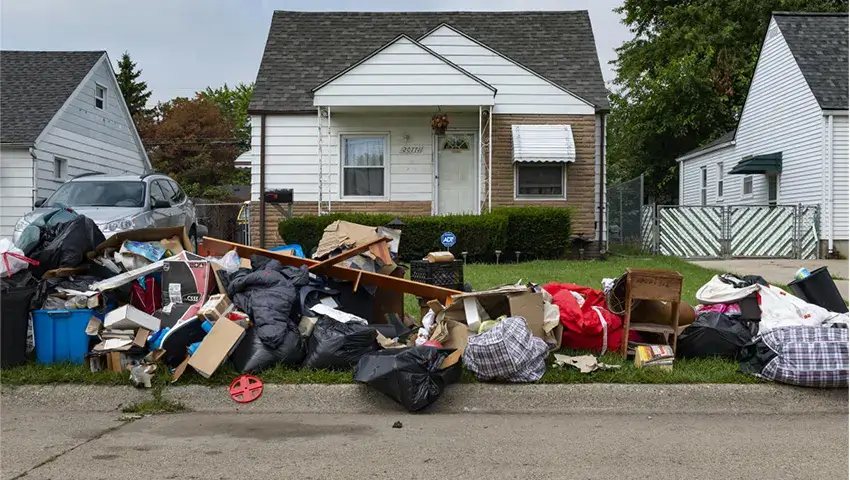Illegal dumping is a frustrating issue for many property owners. Whether it’s old furniture, construction debris, or household waste, unauthorized disposal on private property can lead to environmental damage, health hazards, and financial burdens. Unfortunately, some people choose to dump waste illegally instead of paying proper disposal fees.
If you’re struggling with this problem, don’t worry—you have options. In this guide, we’ll explore why illegal dumping happens, its consequences, and most importantly, the best strategies to stop it.
Contents
Understanding Illegal Dumping
Illegal dumping refers to the disposal of waste in unauthorized locations, such as private land, empty lots, or roadsides. Unlike simple littering, illegal dumping often involves large or hazardous waste.
1. Why does illegal dumping happen?
- Avoiding disposal fees.
- Lack of nearby waste facilities.
- Belief that no one is watching or will enforce penalties.
- Disregard for environmental consequences.
2. Where does it commonly occur?
- Vacant lots and construction sites.
- Private properties with minimal surveillance.
- Remote areas with little foot traffic.
The Consequences of Illegal Dumping
Ignoring illegal dumping can lead to serious problems:
- Environmental Harm: Waste materials can leach chemicals into the soil and water, harming plants and wildlife.
- Health Risks: Dumped waste attracts pests, such as rats and mosquitoes, which spread diseases. Hazardous materials can also pose risks to humans.
- Financial Burden: Property owners may be responsible for cleanup costs, and hiring removal services isn’t cheap.
- Legal Issues: Some regions fine property owners for not addressing illegal dumping, even if they didn’t cause it.
Legal Actions and Reporting
Many cities and counties have strict laws against illegal dumping. Research local regulations to understand your rights and responsibilities.
- Report to Authorities: Contact your local environmental agency or city officials to report incidents.
- Document the Evidence: If you have security footage or photos, provide them when filing a report.
- Understand Property Owner Liability: Some areas may hold landowners responsible for cleanup, but reporting the issue promptly may help avoid penalties.
Preventative Measures to Deter Illegal Dumping
1. Install Security Cameras
A high-quality security camera system is one of the best deterrents. Cameras help:
- Identify offenders with clear video footage.
- Provide evidence for law enforcement.
- Deter potential dumpers who fear being caught.
What to look for in a security camera?
- High-resolution footage (4K preferred).
- Night vision for low-light areas.
- Motion detection with instant alerts.
- Remote access to monitor footage anytime.
One great option is the ZOSI C298 dual lens camera. This camera features dual lenses, providing both a wide-angle view and a zoomed-in close-up at the same time. With 4K resolution, AI-powered person & vehicle detection, and full-color night vision, it offers double deterrence against trespassers and illegal dumpers. Additionally, its pan and tilt capabilities allow for flexible monitoring of large outdoor areas.
8MP PTZ Wifi Outdoor Camera With Dual Lens - 1NC-298
- 4MP+4MP Dual Lens
- Dual Lens Achieves Ultra-wide Field Of View
- AI Person Detection and Auto Tracking
- Starlight Color Night Vision
- Smart Motion Alerts Push
- Two-way Audio & Customize Voice Alerts
- SD Card Storage & Cloud Storage
2. Use Proper Signage
Post clear and visible signs stating:
- “No Dumping – Violators Will Be Prosecuted.”
- Fines or penalties for illegal dumping (if applicable).
- “24/7 Surveillance in Operation.”
3. Install Physical Barriers
Make it difficult for unauthorized vehicles to access your property. Options include:
- Fences and locked gates.
- Large rocks or bollards at entry points.
- Dense shrubbery to block dumping spots.
4. Improve Lighting and Visibility
Dumping often happens in dark, hidden areas. Bright motion-activated lights can scare off illegal dumpers.
5. Engage the Community
Neighbors and local businesses can help monitor suspicious activity. Consider:
- Creating a neighborhood watch program.
- Partnering with local law enforcement for increased patrols.
- Setting up community clean-up events to discourage future dumping.
What to Do If Dumping Continues
If, despite your efforts, illegal dumping persists:
- Capture Clear Evidence: Your security cameras can help identify repeat offenders.
- File a Police Report: If the same individuals are dumping frequently, legal action may be necessary.
- Clean Up Promptly: Leaving waste piles encourages more dumping.
- Consider Legal Action: If you can identify the offender, you may be able to seek compensation for cleanup costs.
Conclusion
Illegal dumping is a serious problem, but with the right approach, you can protect your property. Investing in security cameras, signage, barriers, and community involvement will significantly reduce unauthorized dumping.
By taking these proactive steps, you’ll not only keep your land clean but also contribute to a healthier environment for everyone. Stay vigilant, stay prepared, and take action today!






